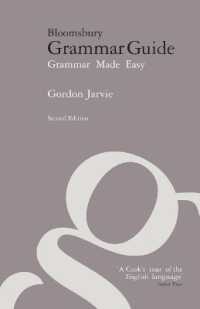- ホーム
- > 洋書
- > 英文書
- > History / World
Full Description
Argentina poses a challenge to economists, economic historians, political scientists, and other concerned with the interrelationship of political and economic forces in developing nations. Although possessed of most of the attributes generally thought necessary for rapid and self-sustaining development, her economy has barely kept up with the population increase, and living standards of large segments of the population have not advanced. The causes of this paradox have never been adequately explained. Ferrer interprets the economic stagnation of Argentina in historical terms, tracing the evolution of the country's economy through four separate stages, beginning with the colonial era in the sixteenth century. Most attention is given to the period of "nonintegrated industrial economy," from 1930 to the present. According to Ferrer, modern Argentina was formed in the second half of the nineteenth century, when the country was integrated into the world economy as a large producer and exporter of agricultural products. The great influx of immigrants and foreign capital led to a rapid disintegration of the traditional society, which had been composed of isolated regional economies with a low level of economic and social development. The Pampa area, an "open space" that had been largely uninhabited, became the nucleus of the subsequent expansion because of its rich land resources and humid and temperate climate. The dislocation of the international economy after the world economic crisis of the 1930's and the rigidity of the Argentine agricultural economy, confronted the country with need to industrialize and diversify its economic structure. Some progress has been made along this road, but Ferrer attributes Argentina's postwar difficulties to the lack of proper answers to the problems of an agricultural economy in transition to a modern industrial society. The author relates economic data to the broader social and political issues. He forsees a definitive confrontation between two social and economic forces: one favoring maintenance of the status quo, the other advocating an enlightened policy of basic industrial growth. The outcome of this confrontation will have a profound impact on the future of Argentina and, indeed, all Latin America. This title is part of UC Press's Voices Revived program, which commemorates University of California Press's mission to seek out and cultivate the brightest minds and give them voice, reach, and impact. Drawing on a backlist dating to 1893, Voices Revived makes high-quality, peer-reviewed scholarship accessible once again using print-on-demand technology. This title was originally published in 1967.








